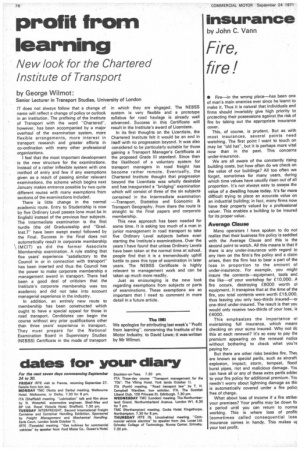Insurance
Page 62

If you've noticed an error in this article please click here to report it so we can fix it.
by John C. Vann
Fire, fire!
• Fire—in the wrong place—has been one of man's main enemies ever since he learnt to make it. Thus it is natural that individuals and firms should invariably give high priority to protecting their possessions against the risk of fire by taking out the appropriate insurance cover.
This, of course, is prudent. But as with most insurances, several points need watching. The first point I want to touch on may be "old hat", but it is perhaps more vital now than in the past. This concerns under-insurance.
We are all aware of the constantly rising building costs, but how often do we check on the value of our buildings? All too often we forget, sometimes for many years, during which time values have usually risen out of all proportion. It's not always easy to assess the value of a dwelling house today. It's far more difficult trying to place an accurate value on an industrial building; in fact, many firms now have their property valued by a professional valuer. This enables a building to be insured for its proper value.
Average Clause
Many operators I have spoken to do not realize that their business fire policy is saddled with the Average Clause and this is the second point to watch. All this means is that if there is any under-insurance with regard to any item on the firm's fire policy and a claim arises, then the firm has to bear a part of the loss in proportion to the amount of under-insurance. For example, you might insure the contents—equipment, tools and the like--of your workshop for £10,000. A fire occurs, destroying £6000 worth ol equipment. It transpires that at the time of the fire, you total contents were worth £15,000, thus leaving you only two-thirds insured—ol one-third under-insured. The result is that yoi. would only receive two-thirds of your loss, it £4000.
This emphasizes the importance 01 maintaining full insurance, which mean: checking on your sums insured. Why not dc this at each renewal? It's so easy to pay the premium appearing on the renewal notice without bothering to check what you're paying for.
But there are other risks besides fire. The are known as special perils, such as aircraft explosion, impact, storm, tempest, flood burst pipes, riot and malicious damage. `lot can have all or any of these extra perils adder to your fire policy for additional premium. Yot needn't worry about lightning damage as thi: is automatically covered under a fire colic) free of charge.
What about loss of income if a fire strike: your premises? Your profits may be down fo a period until you can return to norma working. This is where loss of profit (sometimes called consequential loss insurance comes in handy, This makes 14 your lost profit.










































































































